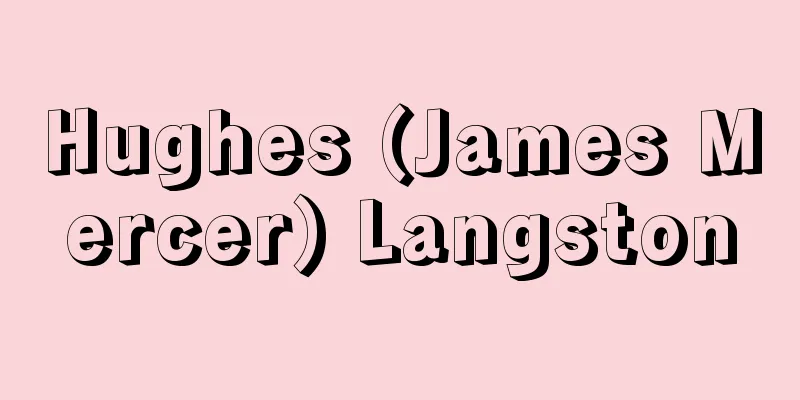Born: February 1, 1902 in Joplin, Missouri
Died: May 22, 1967, New York. American black poet and novelist. After dropping out of Columbia University in 1922, he traveled to Africa and Europe. In 1925, he won first place in the poetry contest held by Opportunity magazine, and was recognized by the poet V. Lindsay. He published his first collection of poems, The Weary Blues (1926), and his second collection, Fine Clothes to the Jew (27). His style of poetry, which skillfully used blues and folk songs, made him an important figure in the Harlem Renaissance of the 1920s. After World War II, he wrote a column for the black newspaper Chicago Defender and published a series of stories called "The Jess B. Simple Stories." His major works include the poetry collections One-Way Ticket (49), Ask Your Mama (61), the novel Not Without Laughter (30), the short story collection Simple Speaks His Mind (50), and the autobiography The Big Sea (40). fuse
Hughes, Charles Evans Born: April 11, 1862 in Glens Falls, New York, USA
Died: August 27, 1948. Osterville, Massachusetts, U.S. American lawyer and politician. Educated at Madison University, Brown University, and other universities. After serving as a professor at Cornell University from 1891 to 1893, he served as a lawyer on the New York State Legislative Committee from 1905 to 1906. He was governor of New York from 1906 to 1910. In 1910, he became a Supreme Court justice, and was particularly active in the field of civil rights. In 1916, he ran for president as a Republican, but was narrowly defeated by W. Wilson. From 1921 to 1925, he served as Secretary of State under Presidents W. Harding and C. Coolidge. From 1921 to 1922, he was active as chairman of the Washington Conference, proposing a 10-year naval truce and helping to conclude the Four-Power Treaty and the Nine-Power Treaty. He became a judge of the Permanent Court of International Justice in 1829 and Chief Justice of the Supreme Court in 1930, and contributed to reconciling the conflict between the executive and judicial branches as the New Deal policies were implemented. fuse
Hughes, Ted Born: August 17, 1930, Mythamroyd, Yorkshire, England
[Died] October 28, 1998. Devon, England. British poet. Real name Edward James Hughes. He studied at Cambridge University and became interested in anthropology. In 1956, he married the American poet S. Plath (who committed suicide in 1963), and they influenced each other. In 1957, he published his first collection of poems, The Hawk in the Rain, which was completely devoid of sentimentality and fiercely celebrated animal power, shocking the poetry world. In addition to collections of poems such as Scapegoats and Rabies (67), Wodwo (67), and Crow (70), he also wrote poems for children and plays (in collaboration with P. Brooke). He became Poet Laureate in 1984. fuse
Hughes, Thomas Born: October 20, 1822, Uffington, Berkshire
[Died] March 22, 1896, Brighton British novelist and thinker. He studied at Rugby School, where T. Arnold was principal, before moving on to Oxford University. Together with FD Morris, he participated in the Christian socialist movement and worked hard to establish a working-class school, serving as its principal from 1872 to 1883. He later became a district court judge. Based on his own experiences, Tom Brown's School Days (1857) is a classic school novel that vividly depicts life at a traditional public school. His works include the sequel Tom Brown at Oxford (61), as well as essays on social movements. fuse
Hughes, William Morris Born: September 25, 1864, London
[Died] October 28, 1952. Australian politician born in Sydney, New South Wales, England. Educated at Westminster, he emigrated to Australia in 1884. He then joined the labour movement, and became a Labour Party member of the House of Representatives in 1901. He served as Attorney General from 1908 to 1915. He became Prime Minister in 1915, and led Australia during and immediately after World War I. In 1916, he split with the majority Labour Party when conscription was implemented, and joined the National Party, becoming its leader. He continued to serve as a member of the House of Representatives for many years after stepping down as Prime Minister in 1923. fuse
Hughes, Richard (Arthur Warren) Born: 19 April 1900, Weybridge, Surrey
[Died] April 28, 1976. Wales. British poet, novelist, and playwright. Graduated from Oxford University. Traveled to America, Canada, and the West Indies, and wrote many novels. His breakthrough work was A High Wind in Jamaica (1929), which depicts a group of boys captured by pirates. Fox in the Attic (61). His other works include the series The Human Predicament. fuse
Hughes, David Edward Born: May 16, 1831, London
[Died] January 22, 1900. Born in London, England. American inventor. Emigrated to America with his parents at the age of seven. In 1850, he became a professor of music at St. Joseph's College in Kentucky. In 1856, he put into practical use the synchronous printing telegraph, which became widely used in Europe and the United States. In 1878, he invented the microphone, which played a major role in the development of the telephone. fuse
Hewes, Joseph Born January 23, 1730 in Kingston, New Jersey.
Died November 10, 1779, Philadelphia. American politician during the American Revolution. One of the signers of the Declaration of Independence. Moved to North Carolina, served in the colonial assembly, and was a delegate to the Continental Congress from 1774 to 1777. He was re-elected in 1779, but died shortly thereafter. He contributed to the creation of the Navy. fuse
fuse A device inserted into an electrical circuit that melts and breaks due to Joule heat when an abnormal current flows through the circuit, preventing damage to the equipment or circuit. It is made of wire or ribbon of metal with a low melting point such as lead, aluminum, or zinc. Source: Encyclopaedia Britannica Concise Encyclopedia About Encyclopaedia Britannica Concise Encyclopedia Information |










